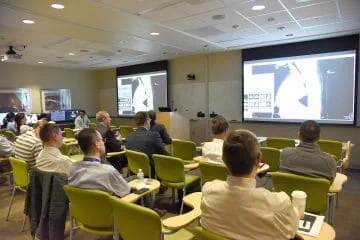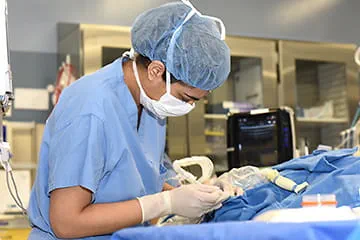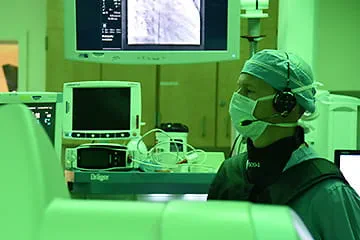The Anesthesia Residency program at Indiana University School of Medicine offers a broad and robust clinical experience in all aspects of the specialty. The core strength of the program lies in the diversity of clinical experience that covers the entire spectrum of surgical procedures.
Residency Training
Video
Learn about the Anesthesia Residency program.
Conference News
The residency program will also be presenting a booth session at the American Society of Anesthesiologists (ASA) Conference on Sunday, Oct. 19. Register for the ASA Meeting to receive booth session details.
Please contact the program coordinator, Belinda Sanborn, with any questions.

Message from the Program Director
Welcome to the Indiana University School of Medicine Department of Anesthesia Residency program! I am honored to be part of a program that has such a rich history in the advancement of anesthesiology. Having completed my residency training here at IU and now serving as the program director, I can speak firsthand about the exceptional training our residents receive. We have a strong reputation for producing excellent clinicians that go on to contribute to anesthesiology in many ways, including academics, research, and private practice. We take pride in educating our residents by exposing them to a robust number and wide variety of cases that prepares them for any career path they choose. Additionally, our weekly didactics and state of the art simulation center provide supplementary educational tools which help prepare our residents to become board-certified anesthesiologists.
As the program director, I have the honor of advocating for our residents in order to ensure they have a positive experience during their three years with us. Guaranteeing they receive the appropriate clinical and educational experience is only part of the mission, as I also have the privilege to mentor and support this group of young physicians in order to promote resilience and well-being on their path to becoming leaders in the field of anesthesiology. We have an extremely talented and accomplished group of faculty whom I am honored to work with and who are passionate about developing the next generation of anesthesiologists.
Our primary goal is to recruit motivated, bright individuals who share our vision in becoming outstanding clinical anesthesiologists. If you are a medical student seeking an anesthesiology residency that will provide you with an inspiring and supportive environment, I cannot think of a better place to begin your career.
Please don’t hesitate to contact me with any questions.
Jennifer Stewart, DO
Residency Program Director
jlanter@iu.edu
Residency Selection Committee
 I am excited to serve as chair of the Residency Selection Committee. We have a team of passionate faculty and residents that understand and celebrate the importance of residency selection. I completed my residency at Indiana University School of Medicine and then completed critical care fellowship at Vanderbilt University. I have served on the Residency Selection Committee as chief resident from 2019–2020 and as faculty from 2021 to present. In my role as faculty, I have had time to truly appreciate how meaningful a good training experience can be — and how much fun it can be to train curious, passionate and hard-working residents! I am proud of the program that we have, and I am proud of the team around me that encourages a culture of inclusivity, intellectual curiosity and integrity. We are privileged to care for patients, and I want to recruit residents that understand how important our job is as anesthesiologists — and take pride in that! If you have any questions about our program or residency recruitment, please contact me at eemhardt@iu.edu. Medicine is a hard but extremely rewarding career — I want to recruit residents that are excited about anesthesiology, want to give patients the best care possible and take ownership of their education and experience.
I am excited to serve as chair of the Residency Selection Committee. We have a team of passionate faculty and residents that understand and celebrate the importance of residency selection. I completed my residency at Indiana University School of Medicine and then completed critical care fellowship at Vanderbilt University. I have served on the Residency Selection Committee as chief resident from 2019–2020 and as faculty from 2021 to present. In my role as faculty, I have had time to truly appreciate how meaningful a good training experience can be — and how much fun it can be to train curious, passionate and hard-working residents! I am proud of the program that we have, and I am proud of the team around me that encourages a culture of inclusivity, intellectual curiosity and integrity. We are privileged to care for patients, and I want to recruit residents that understand how important our job is as anesthesiologists — and take pride in that! If you have any questions about our program or residency recruitment, please contact me at eemhardt@iu.edu. Medicine is a hard but extremely rewarding career — I want to recruit residents that are excited about anesthesiology, want to give patients the best care possible and take ownership of their education and experience.
Chair, Residency Selection Committee
Residency Leadership

Julie D. Dunlap, MD
Assistant Professor of Clinical Anesthesia

Trent G. Gray, MD
Assistant Professor of Clinical Anesthesia

Chad M. Solik, MD
Assistant Professor of Clinical Anesthesia

John M. Sours, MD
Assistant Professor of Clinical Anesthesia

Belinda M Sanborn, BS
Department of Anesthesia
Indiana University School of Medicine
1120 West Michigan Street
Gatch Hall, Room 365
Indianapolis, Indiana 46202
bmsanbor@iu.edu
Residency Training
The Department of Anesthesia training program has approximately 80 total resident positions. The first clinical anesthesia year (CA1/PGY2) begins after the completion of a foundational clinical skills year (PGY1). The department offers four categorical positions which include one clinical base year followed by three clinical anesthesia years. It also offers 22 advanced positions per cohort which provide three clinical anesthesia years.
One advantage of training at Indiana University School of Medicine for residency is the unusual diversity of clinical experiences. Residents rotate through five unique tertiary-care hospitals with widely varying patient-care missions. The education and training in these settings ensure that residents are prepared to provide safe and competent anesthesia care to virtually any patient upon graduation.

Academic Training
Intraoperative education is an essential component of this residency program, and is facilitated by a high ratio of faculty members to residents, a high acuity patient population, and an education structured specialty curriculum. In addition, the first-year, second-year and third-year clinical anesthesia resident classes (CA-1 through CA-3) have separate weekly lectures along with experience-appropriate sessions in the human-patient simulation laboratory.
The didactic aspect of IU School of Medicine’s anesthesiology residency program is structured to develop the necessary knowledge, judgment, and professionalism required of a board-certified anesthesiologist. The curriculum stimulates learners to understand of the science of anesthesiology. Each resident’s progress in both the academic and clinical aspects of anesthesiology is carefully monitored.

Clinical Experience
The anesthesiology residency program at Indiana University School of Medicine offers a broad and robust clinical experience in all aspects of the specialty. The core strength of the program lies in the diversity of clinical experience that covers the entire spectrum of surgical procedures.
Clinical training occurs on the school’s Indianapolis campus at five tertiary-care hospitals: IU Health University Hospital, IU Health Methodist Hospital, Riley Hospital for Children at IU Health, Eskenazi Hospital, and the Roudebush VA Medical Center.

Professional Preparation
In addition to competence in patient care, the anesthesiology residency curriculum prepares physicians to become diplomates of the American Board of Anesthesiology (ABA). As part of preparation for the ABA examinations, residents complete problem-based learning exercises and simulation scenarios throughout the three years of training. Didactic sessions are specifically tailored to prepare residents for the In-Training Exam (ITE), BASIC, and ADVANCED written exams. Mock oral board sessions prepare residents for the APPLIED portion of the board certification exam.
Medical simulation is a core component of training future anesthesiologists. The 30,000-square-foot Simulation Center in Fairbanks Hall at the IU School of Medicine—Indianapolis campus provides additional educational diversity. Formative OSCE training scenarios in the simulation environment prepare residents for the APPLIED portion of the board certification exam.
In addition, the Department of Anesthesia provides weekly Grand Rounds that feature clinical case presentations, journal clubs, morbidity and mortality conferences, and presentations by nationally renowned visiting professors. Attendance and scholarly presentations at the American Society of Anesthesiologists (ASA), Midwest Anesthesia Residents Conference (MARC), and other anesthesiology society meetings are encouraged and supported during residency training.


